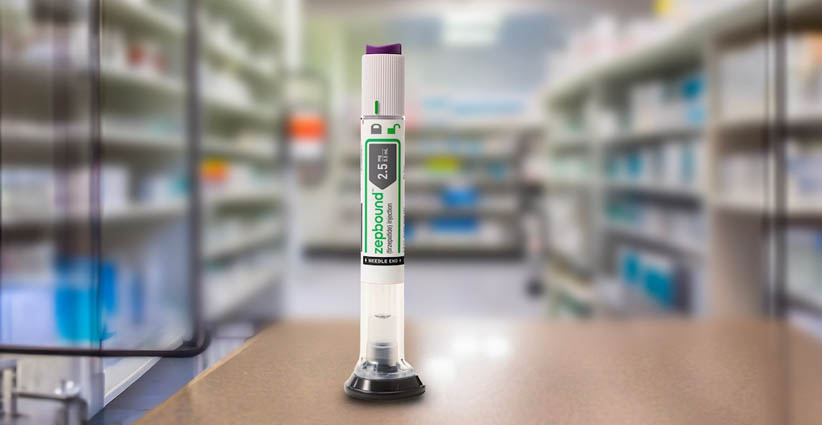Can a Weight-Loss Drug Treat Sleep Apnea on Its Own?
Eli Lilly Reveals Results From Zepbound Clinical Trials
Table of Contents

The Indianapolis-based pharmaceutical company announced April 17 that the weight-loss drug helped to reduce the frequency of breathing disruptions in trial participants who had both obesity and OSA.
People with obstructive sleep apnea experience repeated episodes of shallow or halted breathing during sleep. It is more common in men and people assigned male at birth, and research has shown that the chance of developing OSA increases significantly in people who are obese. The most common treatment method for OSA is a CPAP machine, which delivers pressurized air through a hose and a mask to prevent the user’s airway from collapsing.
The Results
Eli Lilly conducted two concurrent yearlong studies. One involved adults with moderate to severe OSA and obesity. After taking tirzepatide for 52 weeks, the average study participant experienced a 55% reduction in sleep apnea events per hour compared with the start of the trial.
The second trial involved adults with moderate to severe OSA and obesity who used a CPAP machine for the duration of the trial in addition to taking tirzepatide. At the 52-week mark, these individuals averaged a 62.8% decrease in sleep apnea episodes per hour. Across both studies, about 70% of participants were men.
Sleep Apnea and Weight Loss
The tirzepatide trials also tracked the participants’ weight loss. Those who took tirzepatide and used a CPAP machine saw an average weight reduction of about 20%. Those who just took the medication lost approximately 18% of their body weight on average.
Since the Eli Lilly clinical trials only involved obese participants who lost weight, at this time it is unclear to what degree the improvement in sleep apnea symptoms can be attributed to the drug itself as opposed to the act of losing weight.
Studies have shown that losing weight can reduce the severity of OSA and associated side effects like daytime sleepiness. Since the Eli Lilly clinical trials only involved obese participants who lost weight, at this time it is unclear to what degree the improvement in sleep apnea symptoms can be attributed to the drug itself as opposed to the act of losing weight.
The State of Sleep Apnea Drugs
There are currently no drugs approved by the Food and Drug Administration to treat OSA. However, drugs from several pharmaceutical companies have reached clinical trials for OSA treatment. One potential sleep apnea drug, developed by Incannex Healthcare, combines acetazolamide — a medication used to treat varied conditions like glaucoma, congestive heart failure, and epilepsy — with a synthetic form of THC, a chemical found in the cannabis plant.
In 2023, the FDA approved Zepbound as a treatment for chronic weight management in adults who are overweight or obese and have at least one weight-related comorbidity. At that time, the federal agency had already approved tirzepatide, under the brand name Mounjaro, as a type 2 diabetes treatment.
In the press release announcing the trial results, Eli Lilly noted that it plans to share its findings at a scientific symposium in June and also submit the data to a peer-reviewed journal. Following that feedback, the company intends to formally submit the trial results to the FDA in mid-2024.
Got a hot tip? Pitch us your story idea, share your expertise with SleepFoundation.org, or let us know about your sleep experiences right here.
References
8 Sources
-
Eli Lilly and Co. (2024, April 17). Tirzepatide reduced sleep apnea severity by up to nearly two-thirds in adults with obstructive sleep apnea (OSA) and obesity.
https://investor.lilly.com/news-releases/news-release-details/tirzepatide-reduced-sleep-apnea-severity-nearly-two-thirds -
Kline, L. R. (2022, June 1). Clinical presentation and diagnosis of obstructive sleep apnea in adults. In N. Collop (Ed.). UpToDate., Retrieved April 23, 2024, from
https://www.uptodate.com/contents/clinical-presentation-and-diagnosis-of-obstructive-sleep-apnea-in-adults -
Spicuzza, L., Caruso, D., & Di Maria, G. (2015). Obstructive sleep apnoea syndrome and its management. Therapeutic Advances in Chronic Disease, 6(5), 273–285.
https://pubmed.ncbi.nlm.nih.gov/26336596/ -
Malholtra, A. & Kundel, V. (2024, March 26). Obstructive sleep apnea: Overview of management in adults. In N. Collop (Ed.). UpToDate., Retrieved April 23, 2024, from
https://www.uptodate.com/contents/obstructive-sleep-apnea-overview-of-management-in-adults -
U.S. Food and Drug Administration. (2024, February 23). Always tired? You may have sleep apnea., Retrieved April 23, 2024, from
https://www.fda.gov/consumers/consumer-updates/always-tired-you-may-have-sleep-apnea -
ClinicalTrials Arena. (2023, August 22). FDA clears Incannex’s IND for trial of obstructive sleep apnoea therapy.
https://www.clinicaltrialsarena.com/news/fda-incannexs-ind-obstructive-sleep-apnoea/ -
Farzam, A. & Abdullah, M. (2023, July 2). Acetazolamide. In StatPearls. StatPearls Publishing., Retrieved April 24, 2024, from
https://www.ncbi.nlm.nih.gov/books/NBK532282/ -
U.S. Food and Drug Administration. (2023, November 8). FDA approves new medication for chronic weight management., Retrieved April 24, 2024, from
https://www.fda.gov/news-events/press-announcements/fda-approves-new-medication-chronic-weight-management













































































